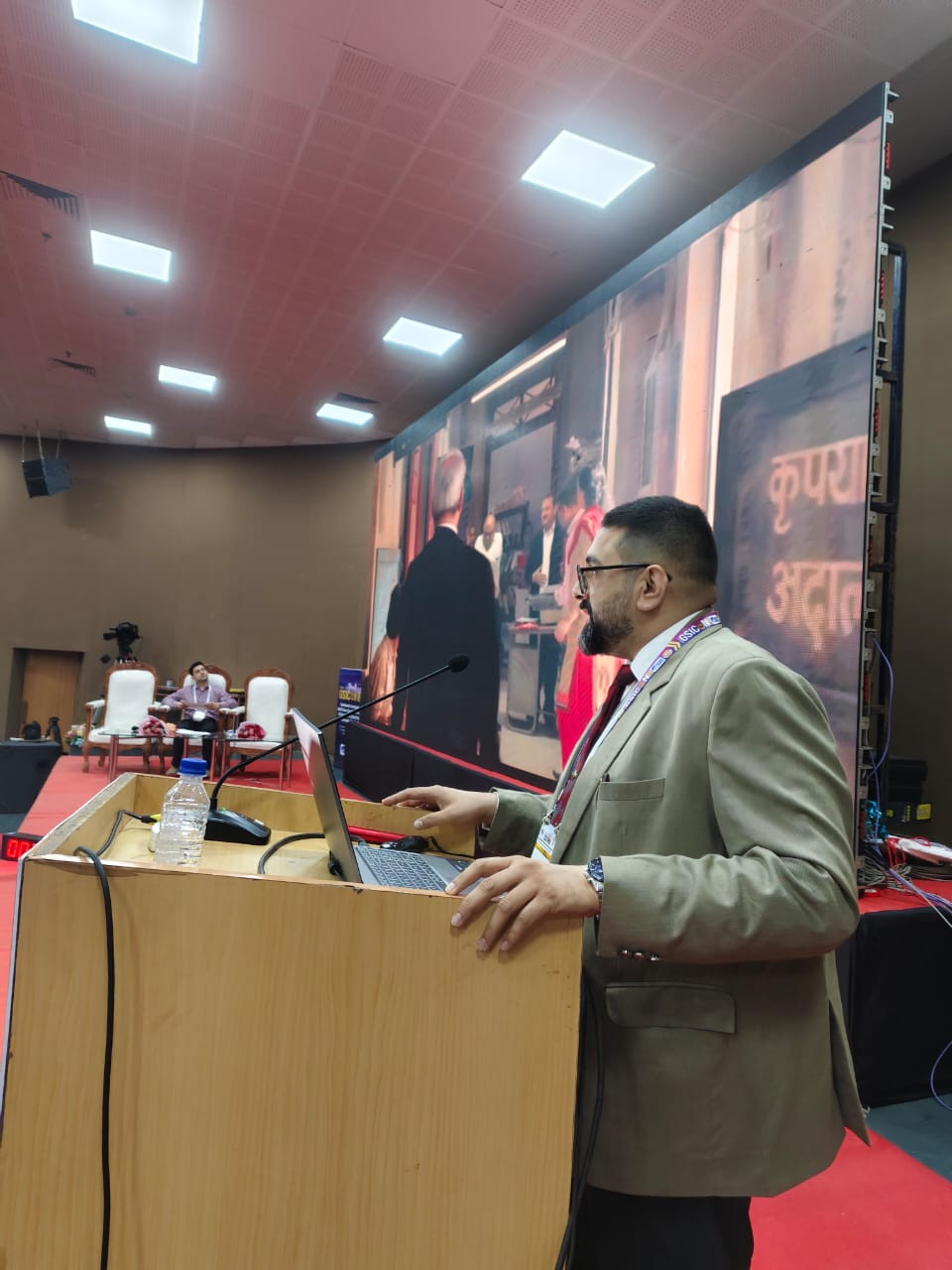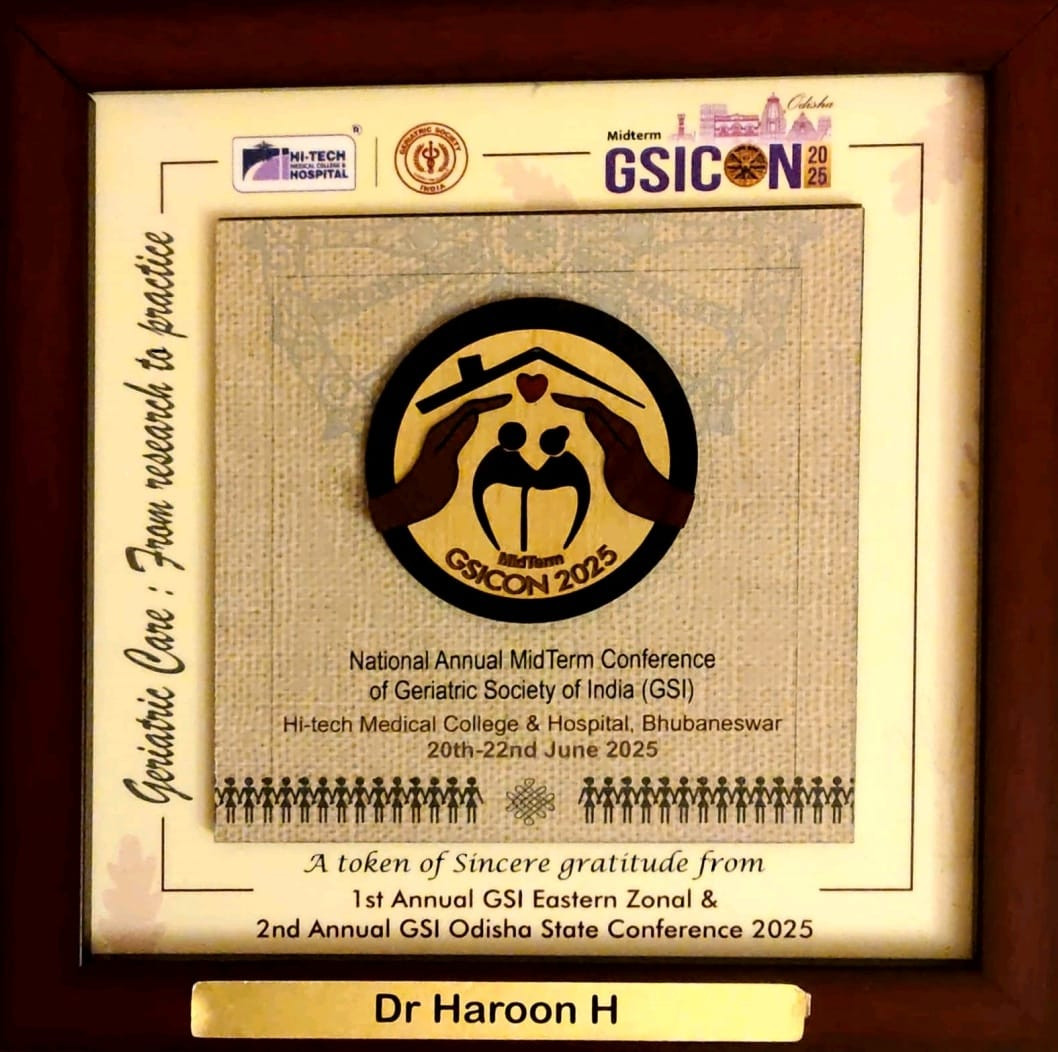Bhubaneswar: Dr Haroon Hussain, senior physician at the Department of Medicine, KMC Hospital, Mangaluru, addressed an important session on Medical Law and Ethics at the National Midterm Conference of the Geriatric Society of India (GSI) held recently in Bhubaneswar between 20-22 June, 2025.
The Geriatric Society of India is a professional organisation working towards improving the health and care of elderly people across the country. The midterm conference served as a platform for medical professionals and experts from different parts of India to discuss and deliberate on challenges and advancements in geriatric care.
During his address, Dr Haroon shed light on the sensitive yet significant topic of end-of-life care. He began by highlighting the complex socio-cultural landscape in India, where even initiating conversations around death is often considered taboo or viewed as apa-shagun (inauspicious).
“While death is an event, dying is a process that takes place while one is still alive. The experiences of patients in this phase, and the emotional journey of their family members, can have long-lasting psychological and social impacts,” he noted.
Dr Haroon stressed the importance of advance care planning, explaining that it is not just a matter of signing a document, but rather an ongoing dialogue. “It is a process involving multiple discussions between the patient, family members, and healthcare professionals to empower patients to make informed decisions about their future medical care,” he said.
He also highlighted the ethical principles that guide end-of-life decisions, including autonomy (the patient's right to make informed choices), beneficence (acting in the patient’s best interest), non-maleficence (doing no harm), and justice (fair and equal treatment).
Touching on the legal aspects, Dr Haroon referred to the landmark 2018 Supreme Court judgement in the Common Cause vs Union of India case, which legally recognised the concept of a ‘Living Will’ or Advance Medical Directive (AMD). This judgment laid the foundation for patients to express their wishes in advance about the kind of medical treatment they would want, or refuse, in case they become terminally ill or unable tox communicate.
The Supreme Court’s guidelines were further simplified through procedural amendments in 2023. As per the law, hospitals are required to set up a Primary Medical Board (PMB) comprising the treating doctor and two senior medical experts to review any case where life-sustaining treatment may be withheld or withdrawn.
A Secondary Medical Board, including three medical experts (one of whom is appointed by the District Medical Officer), must also evaluate the patient’s condition and give its decision within 48 hours. Once both boards and the patient’s surrogate decision-maker reach a consensus, the decision is documented and communicated to the local Judicial Magistrate First Class (JMFC).
Dr Haroon emphasised that during this process, it is essential to respect the wishes mentioned in the Advance Medical Directive. “Treatments that are explicitly refused must not be forced upon the patient. Instead, the focus should shift to symptom control, comfort, and providing holistic palliative care,” he said.
Palliative care, according to him, should aim to relieve suffering while upholding the patient’s dignity, and must also address the psychological, social, emotional, and spiritual needs of both the patient and their caregivers. Grief counselling and family support form an important part of this care.
He concluded by stating that all of this is rooted in Article 21 of the Indian Constitution, which guarantees the right to life with dignity. “Respect for cultural and religious values is also vital in this journey,” he added.
It is worth noting that Karnataka became the first state in India to bring a structured legal mechanism into place for the implementation of Advance Directives.
Let the Truth be known. If you read VB and like VB, please be a VB Supporter and Help us deliver the Truth to one and all.
Bengaluru, Aug 14 (PTI): Karnataka Deputy Chief Minister D K Shivakumar on Thursday said there was a “conspiracy” to tarnish the image of Dharmasthala.
His comments come amid an ongoing investigation by a Special Investigation Team (SIT) into serious allegations of mass burials in the revered temple town in Dakshina Kannada district.
“A conspiracy is being hatched to destroy hundreds of years of legacy. It is not correct to tarnish someone just like that. It has all happened due to one complainant,” he said.
Noting that some Congress MLAs have called for action against those involved in the slander campaign at the legislature party meeting, he said, “ I have told them that action must be taken against those who are indulging in a slander campaign. The CM has also said that action must be taken against such people.”
“I have information on this case. Religious feelings should not be hurt in any manner. Culprits must be punished,” he told reporters, according to a release from his office.
Responding to a question, Shivakumar said the Congress party will not allow the image of any religious place to be tarnished.
“We see everyone equally when it comes to religion,” he added.
The SIT, formed by the state government, is probing claims of mass murder, rape, and mass burials in Dharmasthala over the past two decades.
The complainant, a former sanitation worker whose identity has not been revealed, alleged that between 1995 and 2014 he was forced to handle bodies—including women and minors—and that some showed signs of sexual assault. He has given a statement before a magistrate.
As part of the probe, the SIT has been conducting exhumations at multiple locations identified by the complainant-witness in the forested areas along the banks of the Netravathi River in Dharmasthala, where some skeletal remains have been found at two sites so far.






